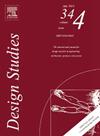专业知识在设计促进实践中的作用:系统回顾
IF 3.2
1区 工程技术
Q2 ENGINEERING, MANUFACTURING
引用次数: 0
摘要
许多组织现在在他们的系统中采用设计来推动创新,导致新的专业设计角色的出现,要求实施设计方法和简化设计过程。然而,很少有研究汇集了促进设计所需的具体专业知识。为了解决这一差距,我们根据PRISMA框架对实证研究进行了系统的文献综述,重点关注已建立的内容以及用于表征专业知识在促进设计干预方面的作用的方法学研究方法。本文将设计促进专业知识概念化,将其从促进者的个人机构和塑造促进环境的实践架构之间的持续互动中产生,强调其生成和共同构建的性质。这种重新概念化强调了将促进专业知识理解为一种不断发展和定位的实践的必要性,塑造了在设计教育和专业实践中如何研究、教授和发展促进。本文章由计算机程序翻译,如有差异,请以英文原文为准。
The role of expertise in design facilitation practice: A systematic review
Many organisations are now adopting design across their systems to drive innovation, leading to the emergence of new professional design roles, requiring the implementation of design methods and facilitation of design processes. However, rarely do studies draw together the specific expertise required for design facilitation. To address this gap, we present a systematic literature review of empirical research, following a PRISMA framework, focusing on what has been established and the methodological research approaches used to characterise the role of expertise in facilitating design interventions. The paper conceptualises design facilitation expertise as emerging from the continuous interaction between the facilitator’s individual agency and the practice architectures that shape the facilitation environment, emphasising its generative and co-constructed nature. This reconceptualisation highlights the need for facilitation expertise to be understood as an evolving and situated practice, shaping how facilitation is researched, taught, and developed across design education and professional practice.
求助全文
通过发布文献求助,成功后即可免费获取论文全文。
去求助
来源期刊

Design Studies
工程技术-工程:制造
CiteScore
8.60
自引率
20.00%
发文量
41
审稿时长
40 days
期刊介绍:
Design Studies is a leading international academic journal focused on developing understanding of design processes. It studies design activity across all domains of application, including engineering and product design, architectural and urban design, computer artefacts and systems design. It therefore provides an interdisciplinary forum for the analysis, development and discussion of fundamental aspects of design activity, from cognition and methodology to values and philosophy.
Design Studies publishes work that is concerned with the process of designing, and is relevant to a broad audience of researchers, teachers and practitioners. We welcome original, scientific and scholarly research papers reporting studies concerned with the process of designing in all its many fields, or furthering the development and application of new knowledge relating to design process. Papers should be written to be intelligible and pertinent to a wide range of readership across different design domains. To be relevant for this journal, a paper has to offer something that gives new insight into or knowledge about the design process, or assists new development of the processes of designing.
 求助内容:
求助内容: 应助结果提醒方式:
应助结果提醒方式:


